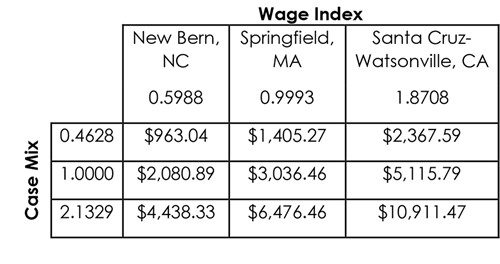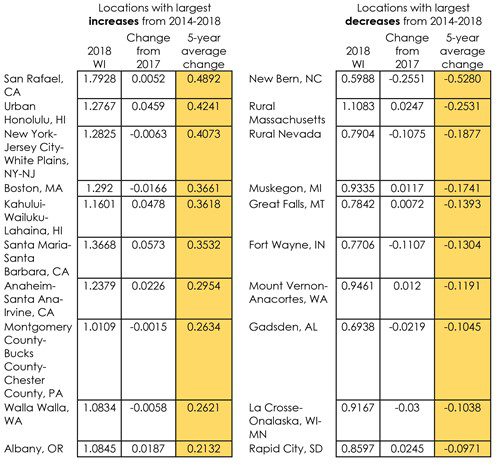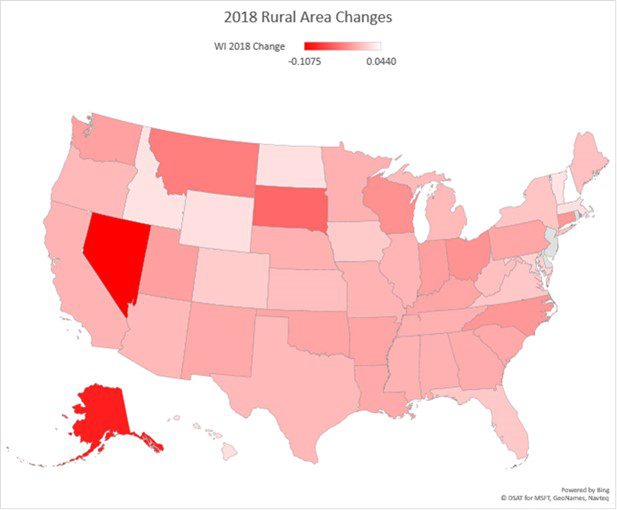Posted on Monday, August 28, 2017 12:35 PM
CMS recently released the proposed home health proposed FY 2018 rules which included case mix weight (CMW) and wage index (WI) updates for CY 2018. In talking with agencies across the country, everyone is focused on the overall headlines of the proposed rules “The proposed policies included in the rule would result in a 0.4 percent decrease (-$80 million) in payments to HHAs in CY 2018”. Unfortunately, not everyone is focusing on the changes to CMW and WI. While CMW adjustments affect everyone in the same way all across the country, the WI adjustments affect all locations differently. Sometimes the change occurring from WI adjustments is nominal, and at other times it is very significant. Changes to both the CMW and WI are typically what catch agencies off guard, especially when comparing agency’s budget vs actual payments as the new year progresses. Changes to the WI can either compound the decrease in payment or help mitigate the changes in CMW. So, in today’s blog, I will focus on the WI impact.
First, let’s start with a refresher on how WI works. WI has a significant impact on the overall episodic payment in the calculation of the labor portion of the 60-day episode payment. The labor portion is 78.525% of the 60-day episode rate multiplied by the CMW. Once the labor portion is calculated, it is then multiplied by the WI based on where the services take place, NOT where the branch or agency is located.
(60-day episode rate * CMW * 0.78525 * WI) + (60-day episode rate * CMW * 0.21465) = 60-day episode payment
*still subject to other applicable adjustments such as rural add-on, NRS, etc.
To show how the WI impacts the 60-day episode payment, let’s look at the extremes and what CMS considers the middle (CMS budgets for CMW average of 1.0000 and WI of 1.0000). Outside of Puerto Rico, New Bern, NC has the lowest WI and Santa Cruz-Watsonville, CA has the highest. The closest WI to CMS budget is Springfield, MA which has a WI of 0.9993. For a list of specific WI, click this link. The CMW range for 2018 ranges from 0.4628 and 2.1329. The chart below shows the large variations of payments.

Since the inception of the HH PPS, CMS has used inpatient hospital wage data in developing the WI to be applied to HH payments. For CY 2018 adjustments, CMS is using FY 2014 hospital cost report data. While CMS needs to use some data to calculate adjustments, it is unclear that tying hospital labor cost to home health labor cost is the best correlation. Reviewing WI changes for the past 5 years, overall changes have been neutral – however, there are locations that have had significant changes in WI during that period.

Wage indexes are tied to specific CBSA locations or if a CBSA is not identified for a location, then state rural data is used. The following map shows changes in WI from 2017 to 2018.

The proposed home health proposed FY 2018 rules also lays out the new payment HHGM model. Wage index does not look to be part of this new payment model. This could change, however, based on CMS’s finalization of this new model.
Corridor can assist in organizations needing assistance in projecting the financial impact for the 2018 proposed rules and the tentative HHGM model. Please contact Amanda Gartner at (701) 347-2448 or agartner@corridorgroup.com for more information.
About Corridor
Corridor is the nation’s preferred partner and trusted business advisor to home health and hospice providers, providing quality services and impactful results for 30 years. Focusing on key operational, regulatory and financial challenges, Corridor delivering industry-unique solutions and deep expertise in coding, clinical documentation review, compliance, billing and collections , consulting and provider staff education . At Corridor, we make the business of caring for people Better! For the most important industry updates and news that impacts home health and hospice, please make sure to sign up for our weekly newsletter to receive the latest up-to-date industry information direct to your inbox!
For additional information, please contact Corridor at 1-866-263-3795.






